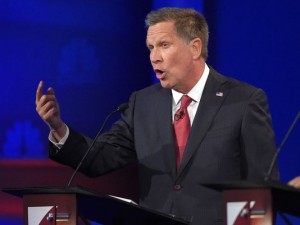 Boulder, Oct. 29 – Republican presidential hopeful John Kasich wasted no time in attacking his opponents and emphasizing his economic record as governor of Ohio during last night’s CNBC debate.
Boulder, Oct. 29 – Republican presidential hopeful John Kasich wasted no time in attacking his opponents and emphasizing his economic record as governor of Ohio during last night’s CNBC debate.
In his opening statement, Kasich was quick to argue that his opponents’ talk of “getting rid of Medicare and Medicaid” was “fantasy.” He said that Washington needs such qualities as “hard work,” “fiscal discipline,” and “creativity” – qualities he claims to have had during his career as a congressman and governor.
He also emphasized his experience as a job creator and bragged that he “cut taxes more than any sitting governor.”
“I went into Ohio where we had an $8 billion hole and now we have a $2 billion surplus,” Kasich said. “We’re up 347,000 jobs.”
His focus on jobs in Ohio also has extended to Ohioans with disabilities. In March 2012, Kasich signed an executive order making his state Employment First, focusing services and resources on competitive, integrated employment for people with disabilities. In 2014, 4,580 Ohioans with disabilities were able to find jobs through vocational rehabilitation services provided by the reformed and renamed Opportunities for Ohioans with Disabilities (OOD).
While there have been gains in jobs for people with disabilities, more work remains to be done in Ohio. There are 812,500 Ohioans with disabilities and, of that number, only 33.5 percent are employed. While additional funding by the General Assembly has eliminated all waiting lists for vocational rehabilitation services, much more work is needed in order to improve employment outcomes for people with disabilities in the Buckeye State.
The progress being made in Ohio has been hampered by the fact that the state returned $18,215,538 to Washington. This hurts economic prospects for people with disabilities–especially the 50,300 Ohioans between the ages of 16 to 20–by not continuing to fund these vocational rehabilitation programs. State vocational rehabilitation programs operate by having the federal government give four dollars for every dollar that is spent by the individual state. However, if the states fail to spend the money or come up with matching funds, then the funds are returned to Washington, D.C.
In talking about income inequality, Kasich argued that as a nation we “need to send power, money, and influence…out of Washington back to the states so we can run these programs from where we live.” He also argued that “income inequality is driven by a lack of skills when kids don’t get what they need to be able to compete and win.”
The importance of skills to the future of our nation’s economy was echoed in a resolution released by Kasich’s office celebrating National Disability Employment Awareness Month. The resolution states: “maximizing the skills and talents of all Ohioans is essential to our state’s success and the skills that individuals with disabilities bring to our workforce…are vitally important.” The resolution concludes by saying “Ohioans with disabilities are a valuable asset” and that the state needs to “encourage businesses to seek out individuals with disabilities for employment.”

Be First to Comment